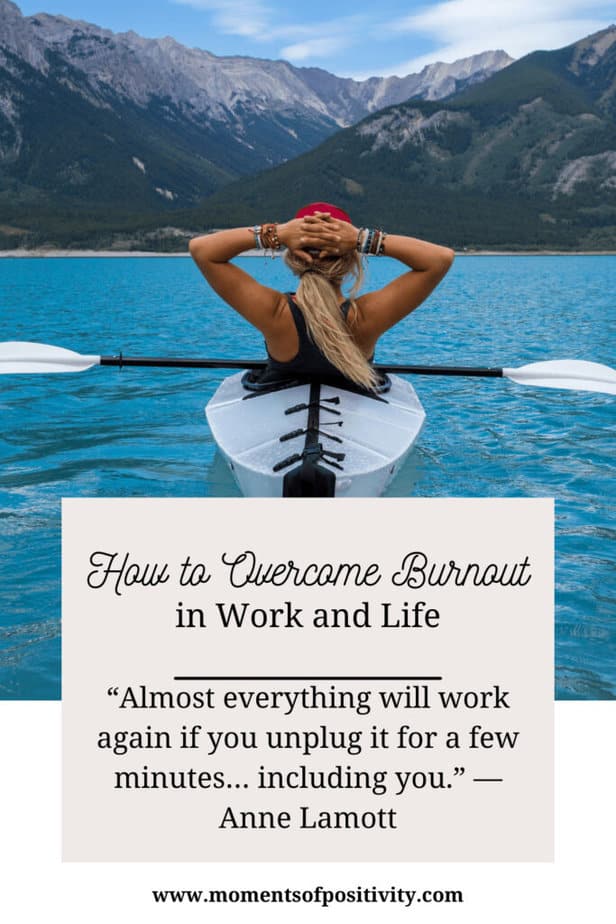Share this
When I look back at my old self a year ago, I see a very critical and cynical person. I dragged myself to work every morning and dreaded getting started. By the end of the day, I was irritable and impatient and took it out on my family. I didn’t feel satisfied with my achievements and lacked the energy to be in the moment with my loved ones. In simple words, I was utterly disillusioned with my job and life.
Does the above seem familiar? If you find some of this resonates with you, then the daily demands of your job and life are wearing you out. You are suffering from ‘Burnout’ – a blend of physical, mental, and emotional fatigue adversely impacting your concentration, performance, and motivation.
What to do if burnout symptoms have already caught you?
Burnout is the manifestation of an underlying emotional cause. If the cause is addressed, the symptoms will disappear. As someone who has overcome burnout and embraced life with renewed vigor and enthusiasm, I can vouch that identifying specific changes in your routine and being consistent with the changes will help you overcome this state of listlessness.
- What to do if burnout symptoms have already caught you?
- Change Your Routine
- Take Care of Your Physical Health
- Identify three priorities for the day
- Synchronize your schedule and productivity patterns
- Put a StopWatch to Work
- Cultivate a Hobby
- Develop and implement a Self-Care Plan
- Talk it out with your loved ones
- The Bottomline
- Author
Change Your Routine
You get up the same time every morning, read the same newspaper, shave with the same razor and cream, eat the same breakfast and go to work using the same route. At work, you perform the same tasks every day. Then you leave your desk at the same time every evening and return to the same home using the same route. How does that sound? Boring, right?
Life is dull if you do the same things, in the same way, every single day. Moreover, you will get the same results, making you feel unexcited and drained out.
Make a change. You don’t necessarily have to shake things up but instead, start with a small habit or pattern that enlivens your life. Like getting up an hour earlier and spending the time on physical exercise or listening to music. Or reading at night instead of watching that soap opera before going to bed. For all you know, one of these very habits may be contributing somewhat to your burnout.
Take Care of Your Physical Health
Good physical health encompasses diet, hydration, energy levels, and sleep patterns. All four have to be in balance to have your body function in harmony. Identify which of these are you giving short shrift to for those extra hours at work.
Are you having a hearty breakfast and taking enough small meals during the day? Do you take plenty of water and juices to keep yourself hydrated? Make sure to get eight-nine hours of restful sleep daily-even if it means switching off the lights earlier than usual. And get your body moving. If you are not someone who can go for a half-hour jog daily, climb up and down the flight of stairs, walk down to the water cooler or simply stand up and down at your desk. Get your body moving.
All the above will positively impact your energy and productivity levels, which in turn will go a long way in alleviating your burnout.

Identify three priorities for the day
Scheduling does not correlate to productivity. Having a choc-a-bloc calendar and a long to-do list makes you feel fatigued and unaccomplished at the end of the day.
Trying to schedule your way to Time Management is a surefire invite to work-life imbalance. Don’t prioritize your schedule; instead, schedule your priorities. Identify the top three tasks during the month, week, day et al. that will leave you with a sense of achievement at the end of the day. Then focus your energies and efforts on those priorities. Everything else can wait; anything apart will be a bonus.
Synchronize your schedule and productivity patterns
We all have our ‘circadian rhythms’- individual cycles of wakefulness and sleep. You will probably know whether you are a morning or evening person. A more detailed self-observation and analysis will help you understand the blocks of time when your energy levels are at their peak and the hours when you feel your productive best.
You can schedule the most challenging tasks for the day during peak energy hours. Likewise, you can schedule routine functions when your concentration is not at its best. The more your schedule aligns with your body’s inner clock, the fewer chances you have of feeling fatigued.
Put a StopWatch to Work
If you are always on the go, you will find it difficult to recharge. Sometimes your heavy workload requires you to work late. Other times, you voluntarily put in the overtime because either you like your work a lot or are in a flow. But if co-workers know that they can easily reach you outside the scheduled office hours, your work-life balance goes for a toss. Put on a mental stopwatch to avoid this.
Set a designated time in the evening when you will get up from your desk, irrespective of work status unless it is an emergency. It won’t be easy at the start, but with time, this will become a habit and allow you to recharge your batteries and return refreshed and energized the next day.

Cultivate a Hobby
All work and no play make Jill a dull girl. Pursuing a purposeful hobby is its own reward and will leave you with a deep sense of satisfaction. More often than not, hobbies are a stress buster at the end of a long day’s work.
Consider creative pursuits such as music, writing or crafts, home improvement projects, gardening, or learning a new language. You will have something to look forward to outside the routine.
Develop and implement a Self-Care Plan
You are the most important person for yourself, and you need to take good care of this important person. Self-care enhances your emotional resilience and mental strength, which stands you in good stead in times of challenges.
Self-care goes beyond the basic needs of eating and sleeping well. It entails pampering yourself and might include a long hot bath, relaxing music, talking to your closest friend, or mindfulness practices. It will be much easier for you to maintain a positive outlook when you feel emotionally sound.
Talk it out with your loved ones
Keeping your stress to yourself will make it worse for you. Instead, if you discuss your worries with a family member or a close friend, you will feel better by the very step of unburdening yourself. They may even help you in their own ways.
Knowing that your loved ones have your back will increase your sense of belonging and connection and make you feel less detached from whatever may be bothering you. It will also help you relax and reduce the feeling of burnout.
The Bottomline
Occasional stress can be related to various causes, such as a heavy workload or lack of sleep. However, if you find yourself drained out and mentally exhausted for a prolonged time, don’t ignore that. Be aware that you’re suffering from burnout, and don’t be afraid to seek professional help from a life coach if needed.
Author
Smita D Jain is a Personal Empowerment Life Coach, Executive Coach, and NLP Coach
Practitioner. Her ‘Empower Yourself’ Coaching Program enables people to transform their
passions into professions and work because they want to and not because they have to. She
has more than 14 years of leadership experience with Fortune 500 companies like KPMG
and JLL. She is also a speaker and a bestselling fiction author. You can learn more about
Smita’s ‘Empower Yourself’ Coaching Programs or book a complimentary strategy session
with her by visiting https://www.lifecoachsmitadjain.com/.




This is a great article full of useful information. Thank you! Since I work from home for my ‘real’ job and also blog as a side hustle, I often find myself feeling burned out, so I have to take a break from it all to re-energize. I like your suggestion of talking it out with your loved ones. This is what I often do to ease the burden.
Glad you like it.